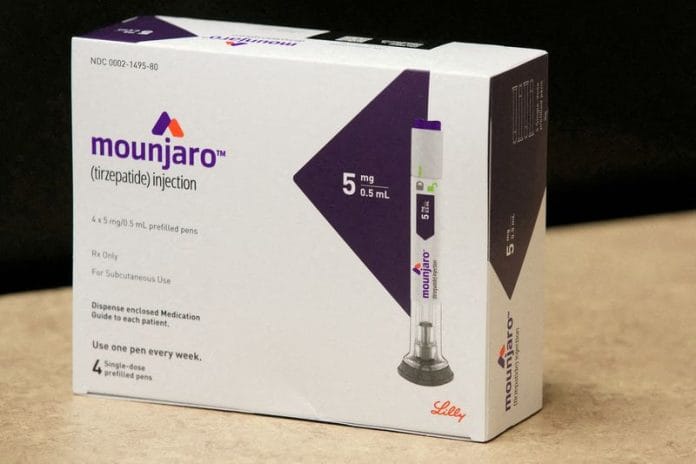By Rishika Sadam and Leroy Leo
HYDERABAD (Reuters) -U.S. drugmaker Eli Lilly expects to launch Mounjaro, its blockbuster diabetes drug and a wildly popular obesity treatment, in India as early as next year, CEO David Ricks told Reuters on Wednesday.
The market opportunity is huge in the world’s most populous country, which has high obesity rates, especially among women, and the second-highest number of people with type-2 diabetes globally. Indian drugmakers are making their own versions of such drugs, while illegal versions are also sold online.
“We’re open to any way to reach more patients as long as it makes sense for the company and we can supply the market,” Ricks said when asked if Lilly was open to authorized generic versions of drugs containing tirzepatide, the active ingredient in popular diabetes and weight-loss drugs.
Mounjaro, which contains tirzepatide, is sold in the UK and Europe under the same brand name for both conditions. However, it is sold as Zepbound for weight loss in the U.S.
Lilly’s drugs as well as Danish rival Novo Nordisk’s in-demand Wegovy and Ozempic are therapies known as GLP-1 receptor agonists, which were developed to control blood sugar in patients with type 2 diabetes.
But they also slow digestion, helping patients feel full longer, which has led to an explosion in their popularity and left Lilly and Novo Nordisk struggling to keep up with demand. The global market for these treatments is expected to reach at least $100 billion by the end of the decade, analysts estimate.
Last year, a top Novo Nordisk official told Reuters the Danish company was aiming to bring Wegovy to India in 2026.
Indian drugmakers, which are among the world’s largest generic drug makers, are already developing their own versions of Wegovy.
These companies include Zydus Lifesciences, Sun Pharma, Cipla, Dr Reddy’s and Lupin.
Of them, Lupin and Cipla are Lilly’s Indian distributors, including for some of its older diabetes treatments such as Eglucent, Aplevant, Basaglar and Trulicity.
INDIAN REGULATIONS
India should boost patent protection, get rid of redundant policies and create a social safety net to win more investment from global drugmakers, Ricks said in his keynote address at the BioAsia conference in the southern Indian state of Telangana.
These steps, he said, would help drive “broader interests for multinationals and foreign direct investment” in India’s pharmaceutical industry.
“India has many specific policies related to its regulatory environment all set up for good reason. But in hindsight, perhaps we can reflect upon them and find redundant policies that only cause delay and extra cost.”
Ricks said these regulatory challenges had the “two-way effect” of making it tough for companies like Lilly to bring new medicines into the market and constraining local biotechs to export their inventions.
(Reporting by Rishika Sadam and Leroy Leo in Hyderabad; Writing by Bhanvi Satija and Kashish Tandon in Bengaluru; Editing by Dhanya Ann Thoppil and Savio D’Souza)
Disclaimer: This report is auto generated from the Reuters news service. ThePrint holds no responsibilty for its content.






